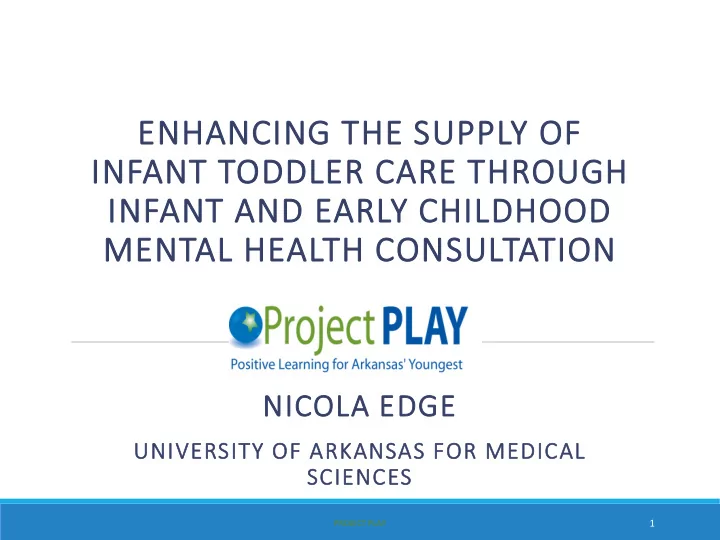

ENHA HANCING T THE S HE SUPPLY O Y OF INFAN ANT T TODDLER C CARE T THROUG UGH H INFANT A AND D EARLY C CHILDH DHOOD OD MENTAL H HEAL ALTH TH C CONSU SULTATI TION NICOLA E EDGE E UNIVERSIT ITY O OF ARKANSAS F FOR OR MED EDIC ICAL L SCIENCES ES 1 PROJECT PLAY
Table Discussion Part 1 Part 2 In your state, community or Identify some of the barriers program, list the kinds of that may be keeping those changes you would like to changes from occurring see in infant-toddler classrooms to enhance quality 2 PROJECT PLAY
Objecti ctives Provide an Overview of IECMHC Describe the Arkansas Model of IECMHC Share data on effectiveness of ECMHC in raising quality and supporting children 3 PROJECT PLAY
What is IECMHC? Teams mental health professionals with child-serving professionals to improve children’s social, emotional and behavioral health and development. Builds the capacity of providers and families to understand the powerful influence of their relationships and interactions on children’s development. Consultants partner to identify and support children with and at risk for mental health challenges as early as possible. Adapted with permission from Dr. Deborah Perry, Georgetown University
◦ Project PLAY is Arkansas’ ECMHC program staffed primarily through partnerships with Community Mental Health Centers ◦ Services provided by mental health professional certified as consultant to child care ◦ Provide system-level consultation to child care and child welfare systems 5 PROJECT PLAY
Prog ogrammatic/Classroom oom Foc ocused C Con onsult ltatio ion • 6 month partnership • Consultants work with teachers • Visits once a week to improve the care offered to • Serve minimum licensed, quality all children in their classroom by rated, state pre-k and Head helping to identify attitudes, Start beliefs and practices and classroom conditions that may • Also offer a menu of trainings be undermining quality • 2010 – prioritized ECMHC for relationships between teachers centers serving foster children and children. Classroom Project PLAY Consultation Model 6 PROJECT PLAY
Programmatic Consultation for Staff and Programs Classroom observation Promote staff wellness Strategies for prosocial Address communication environment issues Training on behavior Promote team building management Training on cultural Support for reflective competence practices Adapted with permission from Dr. Deborah Perry, Georgetown University
Child-Specif ific C Con onsult ltation • 3 month partnership • When a specific child’s behavior • Visits once or twice a week is of concern to parents or teachers, the Mental Health • Offer short-term response plan Consultant helps these adults and longer-term prevention understand, assess and address plan the child’s needs by developing • Linkage to other services an individualized plan with the • Dramatically increased in 2016 parents and teachers. Child Focused Project PLAY Consultation Model 8 PROJECT PLAY
Child- and Family- Centered Consultation Child observations Training on behavior management Program practices Modeling ways to support Staff support for individual individual child and group behavior management Education on children’s mental health Modeling/coaching Advocacy for family Link to community Adapted with permission from Dr. Deborah Perry, Georgetown University
What ECMHC “Isn’t” Formal diagnostic evaluations Therapeutic play groups Individual therapy Family therapy Staff therapy Family support groups
ECE Teacher-Level Outcomes Gain Skills Improve Quality Improve Outcomes • Teacher-Child • Teaching about Interactions • Reduced staff Feelings stress & • Staff • Behavior turnover interactions Management • CLASS Scores Adapted with permission from Dr. Deborah Perry, Georgetown University
AR Da R Data o on I Improving Quality ty throu ough I IECMHC Evaluated impact of ECMHC in 46 centers ◦ Majority non-participants in quality rating system ◦ 37% of teachers had an Associate’s degree or higher ◦ Teachers had average of 8 years of experience Later evaluated in context of expulsion prevention initiative 12 PROJECT PLAY
Improvem ements i in Qual ality i y in AR Classrooms (N=120) 120) TEACHER- CHILD INTERACTIONS MENTAL HEALTH CLIMATE Transitions Sensitivity: becoming more sensitive and positive in Directions and rules interactions Staff awareness & affect Engagement : more engaged in caring for the children Staff-child interactions Teaching feelings and Punitive Actions : use of problem solving yelling, humiliation or using harsh words . Developmentally appropriate practice 13 PROJECT PLAY
Red educed ed D Disrupti tive B e Beh ehaviors Obser erved ed i in AR Clas assrooms 4 before 10 consultation 9 after consultation 3 8 7 6 2 5 4 1 Verbal Physical Other 3 Aggression Aggression Disruptive All Behaviors Problems Behavior 14 PROJECT PLAY
Evidence of Changes in Child- and Family- Level Outcomes Prevent Preschool Suspensions & Expulsions; Improve attachment and resiliency factors Children’s Improved Dyadic Behavior Relationships Problems Reduce Missed Work Days for Parents Adapted with permission from Dr. Deborah Perry, Georgetown University
IECMHC t to P o Prevent Exp xpuls lsio ion 2016 AR Survey New policies and supports in AR to reduce suspension and 57% called expulsion parent (past month) IECMHC is part of 43% support system 9% suspended expelled or expelled 16 PROJECT PLAY
IECMHC REFERRALS BY AGE 40% 38% 36% 35% 30% 25% 20% 15% 15% 10% 6% 5% 3% 2% 0% 1 2 3 4 5 >5
“Johnny” 18 PROJECT PLAY
Child Behavior • Average child externalizing behaviors were well above the clinically significant range at pre-test • The frequency of the behaviors decreased significantly from pre-post test 200 180 160 Pre-test Post-test
Expulsion Outcomes 80% 67% 70% 60% 50% 40% 30% 20% 10% 10% 6% 5% 10% 2% 0% Remained in Expelled Planned Parent Child aged Other center transfer withdrew out/screened child out/moved
Financing Triage specialists pulled from within various units within DHS/DCCECE Shifted resources to expand ECMHC to several new sites TA and ECMHC funded through CCDF and state pre- k quality improvement dollars
22 PROJECT PLAY
ProjectPlay.uams.edu naedge@uams.edu 23 PROJECT PLAY
Recommend
More recommend